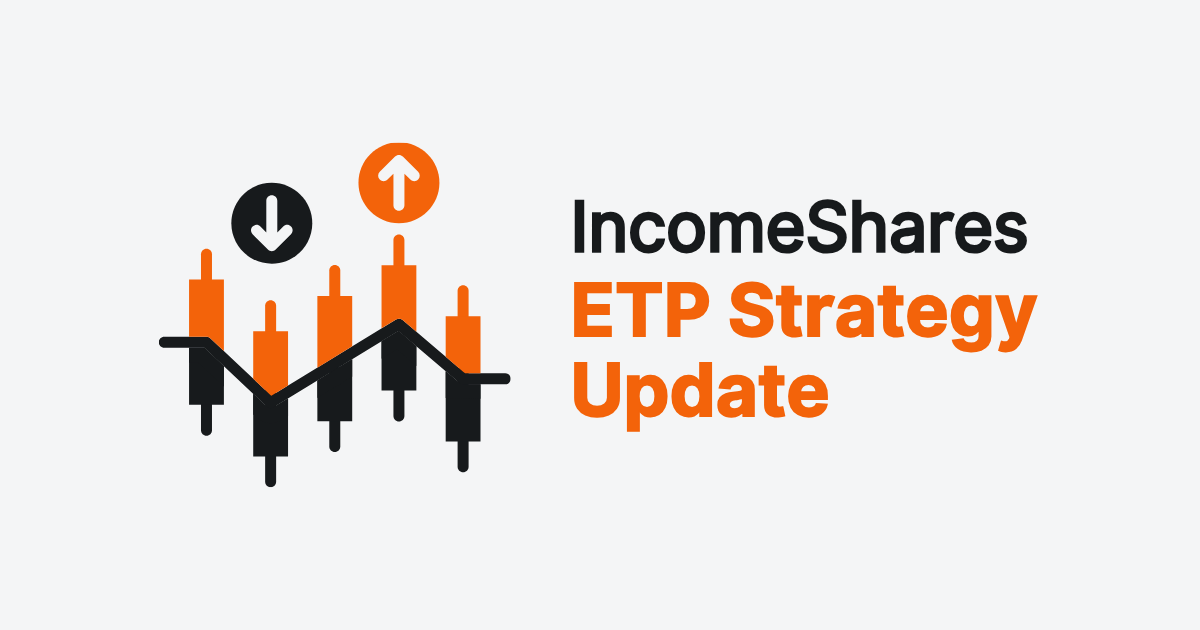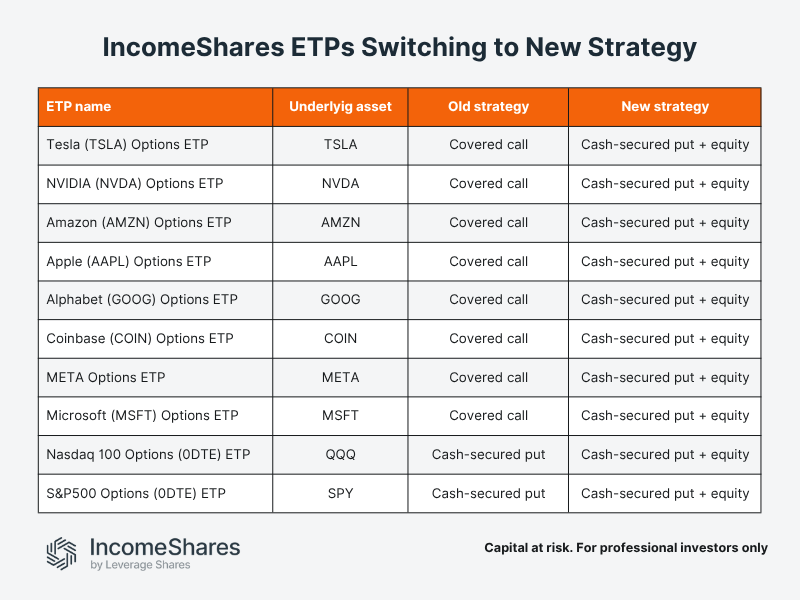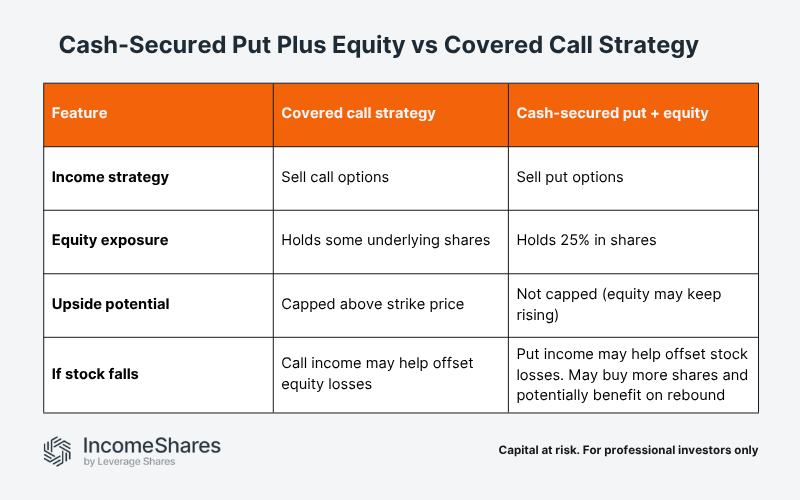.webp)
Author
Jonathan Hobbs, CFA
Date
04 Aug 2025
Category
Market Insights
IncomeShares Strategy Update: Cash-Secured Put Plus Equity
Your capital is at risk if you invest. You could lose all your investment. Please see the full risk warning here.

Starting today, ten IncomeShares exchange-traded products will switch to a different strategy – the cash-secured put plus equity approach. These ETPs will follow the same structure as our new single-stock products launched in June. The new strategy aims to generate more consistent income while keeping some upside potential if stock prices rise.
This article explains which ETPs are affected, how the new structure works, and how it compares to the previous covered call method.
Which IncomeShares ETPs are affected?
The strategy change affects:
- Eight single-stock ETPs, which previously used a covered call strategy.
- Two index ETPs, which previously used a cash-secured put strategy, but without the same equity exposure.
The table below shows the full list of affected ETPs:

How does the new strategy work?
The cash-secured put plus equity strategy aims to earn income from selling put options – while holding some exposure to the underlying asset.
Each ETP combines two parts:
- 25% equity exposure by holding actual shares.
- 75% cash-secured put exposure by selling “in-the-money” (ITM) put options.
The equity exposure gives the ETP some upside potential if the stock price rises.
The cash-secured put part means the ETP sells put options to potentially generate income, while holding enough cash to buy more stock if needed.
The put options used in the strategy are generally in-the-money (ITM) – meaning the strike price is above the current share price. Since that gives put option buyers more “intrinsic value” (essentially, unrealised profit), the ETP may collect more income upfront when it sells them.
How might market conditions affect the cash-secured put plus equity strategy?
If the stock price falls below the strike price: the equity portion may lose value. The ETP (put option seller) may also be required to buy more shares (since the put option buyer has the right to sell the stock).
In that case, the ETP may buy these shares at an effective discount, since it already received the put option income upfront. That income may also help cushion the fall in the stock price from the equity portion.
If the stock price rises above the strike price: the equity portion may increase in value. The put options sold by the ETP may expire worthless. That means the buyer chooses not to exercise the option, and the ETP doesn’t have to buy more shares.
In that case, the ETP keeps the full option income as profit. It may then sell new put options at higher strike prices, potentially earning more income in the next cycle.
How does the new strategy compare with the prior covered call strategy?
Both strategies aim to generate income by selling options, while maintaining some upside exposure to the stock itself. But they approach things in slightly different ways.
The previous covered call strategy held some exposure to the underlying shares while selling call options on the shares. This meant the ETP could earn income from the calls, but any stock price gains above the strike price were capped. So, the ETP had to give up those gains if the stock rallied too far.
The new cash-secured put plus equity strategy works differently. It sells put options and holds some shares. If the stock price falls, the ETP may need to buy more shares. That may help it capture more upside if the stock then rebounds higher. And unlike covered calls, there’s no fixed strike price that caps the upside. The equity may keep gaining value if the stock rises.
So while both approaches sell options and hold some shares, the new strategy may offer a more flexible way to stay exposed to upside potential – with similar income aims.

The original covered call strategy was a simple, systematic approach using static strike prices. It worked well as a starting point. But the updated strategy allows for more flexibility – like adjusting strikes, rolling early, or adapting to volatility – which may help refine how income is generated in different market conditions.
Key takeaways
- Starting today, ten IncomeShares ETPs will switch to a cash-secured put plus equity strategy. This involves selling in-the-money puts while holding some shares.
- This aims to generate more consistent income, while still offering some exposure to upside potential if the stock price rises.
- Unlike covered calls, there’s no fixed cap on gains – the equity may keep rising, and ETP may buy more shares if the stock dips.
Your capital is at risk if you invest. You could lose all your investment. Please see the full risk warning here.
Related Products:
Strategie
Barbesicherte Puts + Eigenkapital
Ausschüttungsrendite
57.27%
Strategie
Barbesicherte Puts + Eigenkapital
Ausschüttungsrendite
43.37%
Strategie
Barbesicherte Puts + Eigenkapital
Ausschüttungsrendite
60.48%
Strategie
Barbesicherte Puts + Eigenkapital
Ausschüttungsrendite
36.12%
Strategie
Barbesicherte Puts + Eigenkapital
Ausschüttungsrendite
45.44%
Strategie
Barbesicherte Puts + Eigenkapital
Ausschüttungsrendite
110.41%
Strategie
Barbesicherte Puts + Eigenkapital
Ausschüttungsrendite
40.24%
Strategie
Barbesicherte Puts + Eigenkapital
Ausschüttungsrendite
43.61%
Strategie
Barbesicherte Puts + Eigenkapital
Ausschüttungsrendite
50.34%
Strategie
Barbesicherte Puts + Eigenkapital
Ausschüttungsrendite
38.13%
